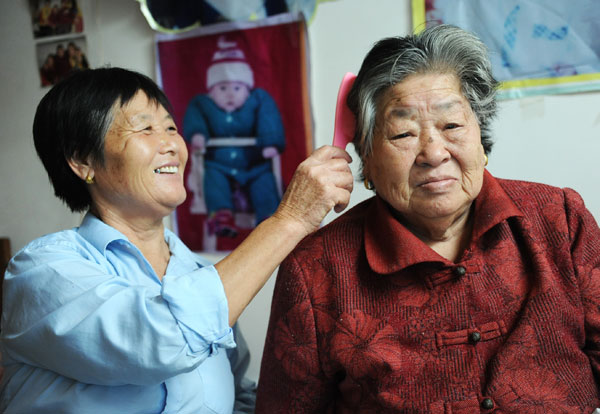

 |
|
A worker helps an elderly woman to comb her hair at a nursing home in Lianyungang city, East China's Jiangsu province, Sept 13, 2013. [Photo/Asianewsphoto] |
The idea is not new in China. Several cities, including Beijing, Shanghai and Nanjing, have tested the program since 2003, but all fared badly due to bottlenecks unique to the country.
One key barrier is China's 70-year leasehold for real estate. According to China's Real Right Law, private property can be leased for only 70 years. Though related laws also stipulate that the leasehold can be automatically extended, the cost of lease extension is not specified.
Volatility of the property market also adds to financial institutions' hesitation over the program as they worry a possible plummet in housing prices may undermine their interests.
The idea also challenges traditional Chinese beliefs that parents will rely on their children to take care of them and leave their properties, especially their houses, to their children for inheritance.
In another community in Hefei City, 90-year-old Shen plays chess with friends, sings, and is in good health. The old man said his children are financially well-off and don't depend on his property, but he is not willing to live off his house for a monthly pension either.
"Elder care facilities and services are still largely inadequate in China. Even if my income rises after I deed my house, I can't guarantee I can receive good-quality care services," Shen said.
Du Hui, owner of a private business in east China's Nanjing City, said the program still faces uncertainties and many situations are hard to predict because there are still no specific rules guaranteeing its soundness.
Du said that he'd prefer to let his parents sell their house in the city and buy another in a quiet neighboring county. They could use the surplus money to buy financial products for profit.
However, things are different for Li Yuzhen. "The only thing I can leave to my son is the house. If I deed my house, I can possibly live a good life, but what about my son? With property prices this high, buying another house is absolutely impossible for him," Li said.
Analysts have proposed that the house-for-pension program mainly serve the childless and elders with deceased children. Du Peng, director of the Gerontology Research Center of Renmin University of China, suggested the program should only be a financial alternative to facilitate elderly care instead of a major pillar to support the old age care system.
"What the government should do is to reassure the public of a decent senior life with a more sound and sustainable elder care mechanism and more advanced infrastructure," said Du Peng.
Ma Li, a counsellor of the State Council, said that the country should build an elder care mechanism that is based on home care and supplemented with assisted living in communities. Meanwhile, facilities and services should be greatly enhanced and more efforts are needed to expand the workforce in the sector.
"As for the house-for-pension proposal, it is only a complementary solution. In cities such as Beijing and Shanghai, the elderly can receive a handsome sum of money through it, but in villages, the elderly get very little because their houses are of limited value," Ma said.